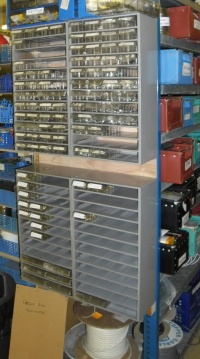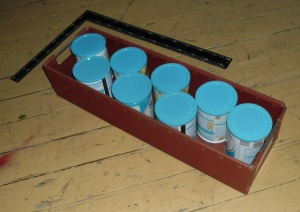Storage Hierarchy
| Information on this page is out of date. The specific problem is: Last significant update to this page was in 2014 Please help update the page if you can. The talk page may contain suggestions. (February 2019) |
 Please see Nottinghack Rules/Guide - Storage
Please see Nottinghack Rules/Guide - Storage
The space has a number of storage systems for various kinds of components and materials for hacking with. There is also place to store members' projects of various dimensions. There is not yet a storage scheme for everything - but there is a hierarchy of different kinds of storage
Member project storage
Storage
 Please see Nottinghack Rules/Guide - Storage
Please see Nottinghack Rules/Guide - Storage
Small to medium projects - these can be stored in 35 litre boxes in either Members Storage or Members Storage Downstairs.
35 litre boxes are often available to buy from the space through HMS. Using these boxes ensures they are of consistent size and can stack. Once a box is bought, it becomes your property. All boxes bought should have your real name on; HMS can be used to create a name label.
Large projects - Temporarily, projects too large to fit in a box can be kept on the Large Project Storage shelves, in the Studio.
Consumables
There are the following storage containers in frequent use at the Hackspace. By restricting the number of different containers we should be able to create an ordered system in time.
A small quantity of something small goes in a small drawer; if more is acquired it is moved to a larger draw or storage container.
Not entirely useful, but we will make improvements as we go on.
Small items
For example, electronic components of various kinds. These are stored in grey metal-framed racks containing 40 small clear styrene drawers, sometimes divide fore-and-aft to make multiple smaller units.[clarify]
Example:
We have a large quantity of these racks, and the example shown will be the location for hardware items such as screws, nuts and bolts. The existing pair of racks over the electronics bench will be supplemented by 4 or 5 more, so that the entire small electronic component stock is contained within them (the other storage, LinBins, etc. will in time be migrated to other areas).
Bigger items
We have some double-width drawers for the grey racks, and these will be used in the Electronics area for larger items. None will be used for workshop hardware as it would be too easy to overload them (excess larger hardware, e.g. woodscrews, can be kept in the suppliers' card boxes until space becomes available)
Larger Quantities of Items
The next level of storage is SMA tins. These are easy to manage as a sub-divider for Anchor Trays as shown:
SMA tins (and Green Tops) if not better organised are kept in one oversize shelf of the metal racking:
Anchor Trays can also contain moderate stocks of an item, especially where larger quantities would become too heavy to handle - for example power packs, or kettle leads. They can also contain multiple, random, collections of items in GreenTops. There is a bay of the metal racking behind the electronics area set aside for Anchor Trays with the shelves at the optimum spacing.
The Biggest Stores
These are 24litre capacity PolyTubs and are kept in the wooden racking in the workshop. The racking is only part-full, and as more storage is required we can buy more of the tubs to fill it.
Miscellaneous Storage
There is a large number of IKEA green-topped plastic containers. As these are sold as a package of varying sizes, they create something of a difficulty when planning ordered storage, so they are generally no longer recommended. The existing GreenTops will be found performing various functions around the 'space, but not generally as part of the Storage Hierarchy.

